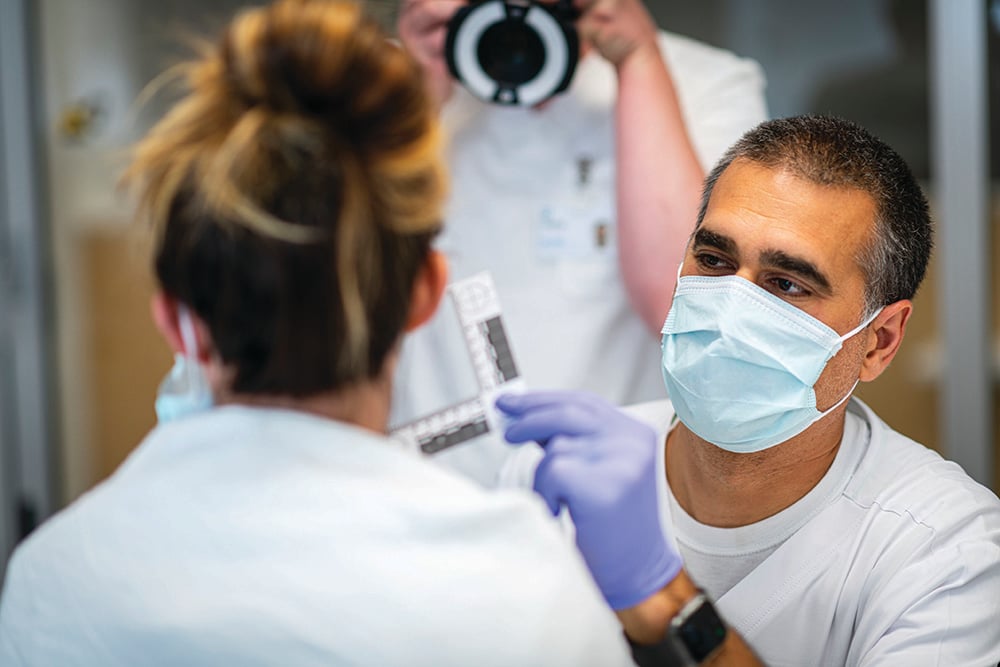COVER STORY
Where Healing Meets Justice
By John Soeder
Specially trained to support victims of violence, forensic nurses combine medical treatment with evidence collection, advocacy
and compassion. | Photo: Shawn Green

FORENSIC NURSING
In the charged atmosphere of an emergency department, every moment matters — especially for victims of violence and trauma. At Cleveland Clinic, these moments are met with uncommon skill and compassion, thanks to the work of forensic nurses who have received advanced training to care for patients who have been physically assaulted, sexually assaulted, trafficked or abused.
“Our role is to bridge medicine and the criminal justice system,” says Michele Reali-Sorrell, DNP, RN, SANE-A, SANE-P, Cleveland Clinic’s forensic nurse manager.
When a patient arrives after a traumatic event, a forensic nurse first provides trauma-informed medical care, then proceeds with meticulous evidence collection (which may include photo documentation of injuries), safety planning after discharge and follow-up care. Nurses are trained to remain calm, nonjudgmental and present throughout an exam that can take several hours.
“We’re there with the patient for as long as they need us,” Dr. Reali-Sorrell says. “We take a deep breath with them. We don’t rush.”
Cleveland Clinic’s forensic nursing program includes seven full-time nurses and approximately 30 on-call nurses who cover 13 emergency departments across five Northeast Ohio counties. They’re often called to the emergency department but also respond in inpatient units, ICUs, and outpatient care settings. Nurses are available around the clock, including weekends and holidays, and they see patients of all ages.
The forensic team works closely with physicians, social workers and advocates as well as law enforcement officers. Their work isn’t limited to physical injuries; they also assess for psychological trauma and initiate appropriate referrals. Offerings include a dedicated follow-up clinic, Care After Trauma (CAT), and a mental health offshoot, Emotional Care After Trauma (E-CAT). “We’re identifying gaps in care and working to make access seamless,” Dr. Reali-Sorrell says.
A new virtual consult program allows forensic nurses to assist patients in real time across all Cleveland Clinic EDs, especially in low-acuity cases.
The forensic nursing team also boasts Ohio’s first mobile forensic medical unit. Based out of Cleveland Clinic Mentor Hospital, the unit is staffed by a physician, a forensic nurse and an EMS lead. It provides on-site care to human trafficking victims who might otherwise never seek help. “We realized we had to bring the medical care to the victim and not expect them to go to the emergency department,” says Dr. Reali-Sorrell. “It’s a game-changer.”
The team’s impact isn’t just medical — it’s legal. Forensic nurses often testify in court, detailing the care they provided and the evidence they collected. “We get about 100 subpoenas a year,” Dr. Reali-Sorrell says. “We’re part of the collaborative effort along with law enforcement and prosecutors to help put criminals behind bars and keep our communities safe.”
Working toward becoming a global center of excellence in forensic nursing, Cleveland Clinic hopes someday to be a training ground for nurses worldwide. A planned $5 million estate gift from a donor will help make that vision a reality.
“We’re standing up for those without a voice,” says Dr. Reali-Sorrell. “We’re helping them start their journey of healing. And we’re doing our part to make sure what happened to them doesn’t happen to someone else.”
